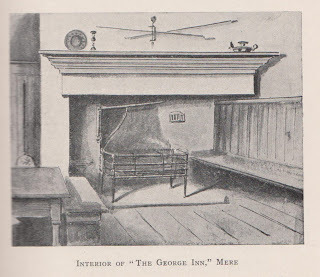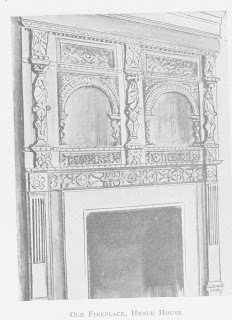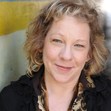October 6, 1651 - from Trent to Salisbury
After a stay of ten days at Trent, following his originalstay of several days, Charles was finally ready to set out once again, hopingthat the newest plan to get him safely out of the country would succeed.
At about ten o'clock on the morning of Monday, October 6, asAnne Wyndham wrote, "his majesty took leave of the old Lady Wyndham, thecolonel's lady [Anne herself], and family, not omitting the meanest of themthat had served him; but to the good old lady he vouchsafed more than ordinaryrespect, who accounted it her highest honour that she had three sons and onegrandchild slain in the defence of the father, and that she herself, in her oldage, had been instrumental in the protection of the son, both kings of England."Thus his sacred majesty, taking Mrs. Juliana Coningsbybehind him, attended by Colonel Robert Phelips and [Wyndham's servant] Peters,bad farewell to Trent, the ark in which God shut him up when the floods ofrebellion had covered the face of his dominion."
The party "went under the conduct of Coll. Phelipps inprivate ways," Phelips recounted, "(all that country being well known to him)nere 40 myles that day to the house of the Widdow Hyde at Hele, 3 myles distantfrom Salisbury, a very discreet gentlewoman. Hither was Dr. Henchman come before from Salisbury to provide for theirereception."Thomas Blount's Boscobel describes the journey. "The travellers passed by Wincanton, and near the midst of that day's journey arrived at Mere, a little market town in Wiltshire, and dined at the George inn; the hoast, Mr. Christopher Phillips, whom the colone knew to be perfectly honest. [image error] The George Inn, Mere
from Alan Fea's The Flight of the King"The hoaste sat at the table with his majesty [Charles was once more pretending to be Will Jackson, this time a servant of Phelips], and ... told the colonel, for news, that he heard the men of Westminster (meaning the rebels), notwithstanding their victory at Worcester, were in a great maze, not knowing what was become of the king; but (says he) it is the most received opinion that he is come in a disguise to London, and many houses have been searched for him there: at which his majesty was observed to smile. Interior of the George Inn, Mere
Interior of the George Inn, Mere
from The Flight of the King"After dinner, mine hoast familiarly asked the king 'if he were a friend to Caesar?' to which his majesty answered, 'Yes.' 'Then,' said he, 'here's a health to King Charles,' in a glass of wine, which his majesty and the king both pledged.... And his majesty, since his happy return, has been pleased to ask 'What was become of his honest hoast at Mere?'"According to Alan Fea's 1908 The Flight of the King, "Once more upon their way, the road to Salisbury is in a direct line, nearly due east, but in the seventeenth century this part of the country was but little enclosed, so that the journey to Heale could be accomplished if necessary without hardly touching a village."In the evening they reached Heale House, on the banks of theAvon near Amesbury in Wiltshire. This was the home of Mary Hyde, widow ofLaurence Hyde, the eldest brother of Sir Robert Hyde, Justice of Common Pleas,and a cousin to Charles's chancellor Edward Hyde, and so a staunchly Royalistlady. In 1680, Charles told Samuel Pepys, "I came into the Housejust as it was almost dark (with Robin Phillips only) not intending at first tomake myselfe knowne. But just as Ialighted at the Doore, Mrs. Hide knew me, though she had never seen mee butonce in her life, and that was with the King my Father, in the Army, when wemarched by Salisbury some yeares before in the time of the Warr. But she being a discreet Woman took noe noticeat that time of me, I passing only for a friend of Robin Phillips's, by whoseadvice I went thether.
 Old fireplace at Heale House
Old fireplace at Heale House
from The Flight of the King"At supper there was with us Frederick Hyde, (since a Judge)and his sister in law a Widdow, Robin Phillips, my Selfe, and Dr. Henshaw(since Bishop of London) whome I had appointed to meet me there.
"While we were at supper I observed Mrs. Hyde and her BrotherFrederick to looke a little earnestly at me, which ledd me to beleive they mightknow me. But I was not at all startledat it, it having been my purpose to lett her know who I was. And accordingly after supper Mrs. Hyde cameto me, and I discovered my selfe to her, who told me shee had a very safe placeto hide me in, till we knew whether any ship was ready or noe. But she sayd it was not safe for her to trustany Boddy but her selfe and her sister, and therefore advised me to take myHorse the next morning, and make as if I quitted the House, and returne againabout night. For she would order it soe,that all her servants and everybody should be out of the House but her selfeand her sister, whose name I remember not."
At about ten o'clock on the morning of Monday, October 6, asAnne Wyndham wrote, "his majesty took leave of the old Lady Wyndham, thecolonel's lady [Anne herself], and family, not omitting the meanest of themthat had served him; but to the good old lady he vouchsafed more than ordinaryrespect, who accounted it her highest honour that she had three sons and onegrandchild slain in the defence of the father, and that she herself, in her oldage, had been instrumental in the protection of the son, both kings of England."Thus his sacred majesty, taking Mrs. Juliana Coningsbybehind him, attended by Colonel Robert Phelips and [Wyndham's servant] Peters,bad farewell to Trent, the ark in which God shut him up when the floods ofrebellion had covered the face of his dominion."
The party "went under the conduct of Coll. Phelipps inprivate ways," Phelips recounted, "(all that country being well known to him)nere 40 myles that day to the house of the Widdow Hyde at Hele, 3 myles distantfrom Salisbury, a very discreet gentlewoman. Hither was Dr. Henchman come before from Salisbury to provide for theirereception."Thomas Blount's Boscobel describes the journey. "The travellers passed by Wincanton, and near the midst of that day's journey arrived at Mere, a little market town in Wiltshire, and dined at the George inn; the hoast, Mr. Christopher Phillips, whom the colone knew to be perfectly honest. [image error] The George Inn, Mere
from Alan Fea's The Flight of the King"The hoaste sat at the table with his majesty [Charles was once more pretending to be Will Jackson, this time a servant of Phelips], and ... told the colonel, for news, that he heard the men of Westminster (meaning the rebels), notwithstanding their victory at Worcester, were in a great maze, not knowing what was become of the king; but (says he) it is the most received opinion that he is come in a disguise to London, and many houses have been searched for him there: at which his majesty was observed to smile.
 Interior of the George Inn, Mere
Interior of the George Inn, Merefrom The Flight of the King"After dinner, mine hoast familiarly asked the king 'if he were a friend to Caesar?' to which his majesty answered, 'Yes.' 'Then,' said he, 'here's a health to King Charles,' in a glass of wine, which his majesty and the king both pledged.... And his majesty, since his happy return, has been pleased to ask 'What was become of his honest hoast at Mere?'"According to Alan Fea's 1908 The Flight of the King, "Once more upon their way, the road to Salisbury is in a direct line, nearly due east, but in the seventeenth century this part of the country was but little enclosed, so that the journey to Heale could be accomplished if necessary without hardly touching a village."In the evening they reached Heale House, on the banks of theAvon near Amesbury in Wiltshire. This was the home of Mary Hyde, widow ofLaurence Hyde, the eldest brother of Sir Robert Hyde, Justice of Common Pleas,and a cousin to Charles's chancellor Edward Hyde, and so a staunchly Royalistlady. In 1680, Charles told Samuel Pepys, "I came into the Housejust as it was almost dark (with Robin Phillips only) not intending at first tomake myselfe knowne. But just as Ialighted at the Doore, Mrs. Hide knew me, though she had never seen mee butonce in her life, and that was with the King my Father, in the Army, when wemarched by Salisbury some yeares before in the time of the Warr. But she being a discreet Woman took noe noticeat that time of me, I passing only for a friend of Robin Phillips's, by whoseadvice I went thether.
 Old fireplace at Heale House
Old fireplace at Heale Housefrom The Flight of the King"At supper there was with us Frederick Hyde, (since a Judge)and his sister in law a Widdow, Robin Phillips, my Selfe, and Dr. Henshaw(since Bishop of London) whome I had appointed to meet me there.
"While we were at supper I observed Mrs. Hyde and her BrotherFrederick to looke a little earnestly at me, which ledd me to beleive they mightknow me. But I was not at all startledat it, it having been my purpose to lett her know who I was. And accordingly after supper Mrs. Hyde cameto me, and I discovered my selfe to her, who told me shee had a very safe placeto hide me in, till we knew whether any ship was ready or noe. But she sayd it was not safe for her to trustany Boddy but her selfe and her sister, and therefore advised me to take myHorse the next morning, and make as if I quitted the House, and returne againabout night. For she would order it soe,that all her servants and everybody should be out of the House but her selfeand her sister, whose name I remember not."
Published on October 06, 2011 16:55
No comments have been added yet.
www.theroyalmiracle.blogspot.com
My adventures in researching "The September Queen," the daily events in the six week odyssey when Charles II escaped after the Battle of Worcester on September 3, 1651 and tried desperately to reach s
My adventures in researching "The September Queen," the daily events in the six week odyssey when Charles II escaped after the Battle of Worcester on September 3, 1651 and tried desperately to reach safety in France, and more about Jane Lane, the heroine of "The September Queen.
...more
- Gillian Bagwell's profile
- 228 followers



